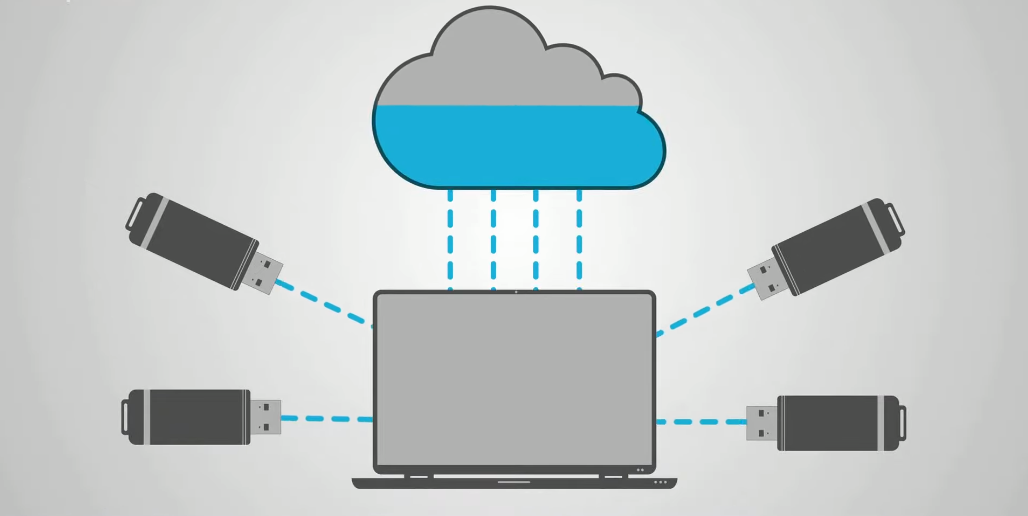Cloud storage relies on encryption during data transfer and storage, access control mechanisms like multi-factor authentication, and stringent physical security at data centers. While data breaches are a concern, providers invest in continuous monitoring and audits to detect and mitigate threats. Data loss risks are minimized through redundancy, and privacy concerns are addressed with strict policies. With informed choices and reputable providers, cloud storage is a secure option for safeguarding your valuable data.
What is Cloud Storage?
Cloud storage is a service that allows you to store and access data over the internet rather than on your local computer or server. This data can include documents, photos, videos, and much more. Popular cloud storage providers include Dropbox, Google Drive, and Amazon Web Services (AWS).
How Does Cloud Storage Work?

Cloud storage operates through data centers, highly secure facilities housing servers, and storage devices. When you upload data to the cloud, it’s distributed across multiple servers in these centers. This redundancy ensures that even if one server fails, your data remains accessible.
Advantages of Cloud Storage:

Encryption
1. In-Transit Encryption
In-transit encryption safeguards your data while it’s being transferred between your device and the cloud server. Secure Sockets Layer (SSL) or Transport Layer Security (TLS) protocols are commonly used to encrypt data during transit, making it nearly impossible for cybercriminals to intercept and decipher.
2. At-Rest Encryption
At-rest encryption, on the other hand, protects your data when it’s stored on the cloud servers. Cloud service providers employ robust encryption algorithms to ensure that the data remains indecipherable even if someone gains unauthorized access to the physical servers.
Access Control and Authentication
Cloud providers implement access control and authentication mechanisms to ensure that only authorized users can view or modify data.
1. Multi-Factor Authentication (MFA)
MFA adds an extra layer of security by requiring users to provide multiple verification forms, such as a password and a temporary code sent to their mobile device. This significantly reduces the risk of unauthorized access.
2. Role-Based Access Control (RBAC)
RBAC allows organizations to define specific roles and permissions for users. For example, an employee may have read-only access to certain files, while a manager has full control. This granular control minimizes the chance of data breaches.
Regular Backups
Cloud providers perform regular backups of your data. This means that even if you accidentally delete a file or it becomes corrupted, you can retrieve a previous version. It’s like having a safety net for your data.
Compliance with Regulations
Reputable cloud providers adhere to industry-specific regulations and standards, such as HIPAA for healthcare data and GDPR for European data protection. Compliance with these regulations ensures that your data is handled carefully and according to legal requirements.
Data Center Security
The physical security of data centers where your information is stored is also critical to cloud security. Reputable cloud service providers invest heavily in data center security, employing biometric access controls, surveillance, and 24/7 monitoring.
Disadvantages of Cloud Storage:
Data Breaches
No system is entirely foolproof, and data breaches are always risky. Cybercriminals are continually evolving their tactics to gain unauthorized access to data, so choosing a provider with a strong track record of security is crucial.
User Error
Sometimes, the weakest link in data security is the user. Accidental data deletion or sharing sensitive information with the wrong person can pose risks. Proper training and awareness are essential to mitigate these risks.
Downtime
Like any technology, cloud services can experience downtime due to maintenance or technical issues. While reputable providers have high uptime percentages, it’s wise to have a backup plan if your data becomes temporarily inaccessible.
Tips for Ensuring Data Safety in the Cloud:

Choose a Reputable Provider
Research and select a well-established cloud storage provider known for its security measures and reliability.
Enable Two-Factor Authentication (2FA)
Add an extra layer of security by enabling 2FA on your cloud storage account. This requires a second verification form, such as a code sent to your mobile device.
Regularly Update Passwords
Change your passwords periodically and avoid using easily guessable ones. A strong, unique password is your first line of defense.
Is cloud storage safer than physical storage?
The safety of cloud storage compared to physical storage depends on various factors and how well each is managed. Cloud storage offers several security advantages, such as robust encryption, redundancy, and access controls, making it a secure option for many users. Cloud providers invest heavily in data center security and regulation compliance, further bolstering safety. However, the safety of cloud storage also relies on the provider’s trustworthiness, so choosing a reputable one is crucial.
On the other hand, physical storage, like external hard drives or USBs, puts the onus of security on the user. While it provides more tangible control over data, it is susceptible to physical damage, theft, or loss. In essence, the safety of cloud storage can often surpass that of physical storage, provided users make informed choices, implement best practices, and select reliable providers.
Conclusion:
Cloud storage offers robust security measures, including encryption, access control, and data center security. While no system is entirely foolproof, cloud providers’ redundancy and proactive security measures significantly mitigate risks. By staying informed and choosing reputable providers, you can confidently use cloud storage while keeping your data safe. Your data’s security in the cloud ultimately depends on your choice of provider and your diligence in implementing best practices for data protection. So, while the cloud is a powerful tool for data storage and access, it is essential to approach it with trust and vigilance to ensure your valuable information remains secure.
FAQs:
Is cloud storage safer than local storage?
Cloud storage can be as safe as, or even safer than, local storage when managed correctly. Reputable providers invest heavily in security measures, but users must follow best practices, such as strong password management and enabling two-factor authentication, to ensure their data’s safety.
Can cloud providers access my data?
No, reputable cloud providers do not access your data without your permission. They prioritize user privacy and have strict policies to protect your data. Your data is encrypted and secured, and cloud providers typically only access your data when required for maintenance or troubleshooting. And even then, it’s done with user consent and under strict security protocols.
Is it safe to store sensitive information in the cloud?
Yes, storing sensitive information in the cloud can be safe, provided you choose a reputable provider, implement strong access controls, and encrypt your data. Reputable cloud providers offer robust security measures to protect your data, and when combined with best practices on your part, cloud storage can be a secure option for sensitive information.
What should I do in a data breach involving my cloud storage?
If you suspect a data breach involving your cloud storage, it’s crucial to act swiftly. Contact your cloud provider immediately to report the incident. They will guide you through the necessary steps to secure your account, investigate the breach, and take appropriate measures to mitigate any potential damage. Prompt action can minimize the impact of a breach.
Can I trust cloud providers to comply with data protection regulations?
Yes, reputable cloud providers prioritize compliance with data protection regulations. Many cloud providers adhere to stringent security standards and undergo third-party audits to meet regulatory requirements. It’s essential to research your chosen cloud provider’s compliance certifications and policies to ensure they align with your specific needs and industry regulations.
Are there any free cloud storage options that are secure?
Yes, some free cloud storage options offer a reasonable level of security. Providers like Google Drive and Dropbox offer free plans with strong security features. However, consider paid plans that typically provide more advanced security options for sensitive or large amounts of data.
Can I encrypt my data before uploading it to the cloud?
Yes, you can encrypt your data before uploading it to the cloud for an additional layer of security. Various encryption tools and services allow you to encrypt your files before storing them in the cloud.
